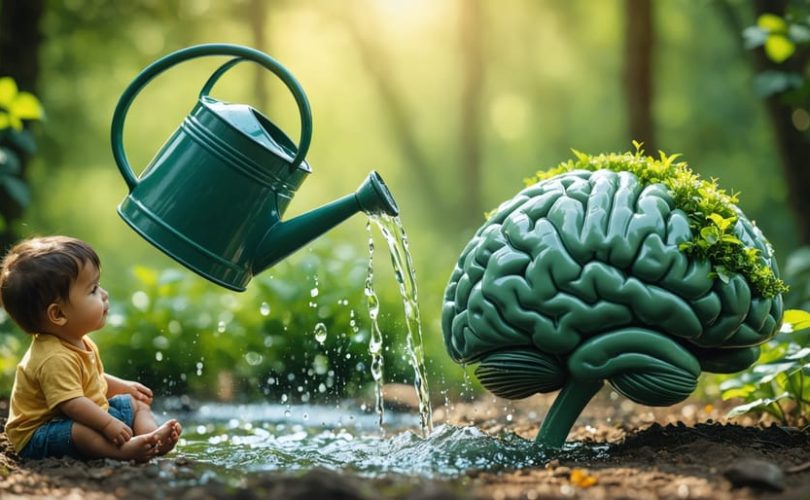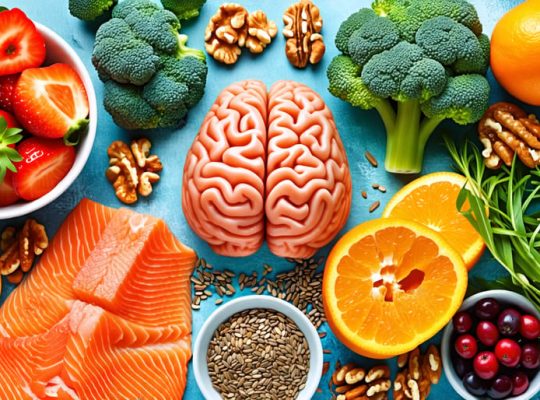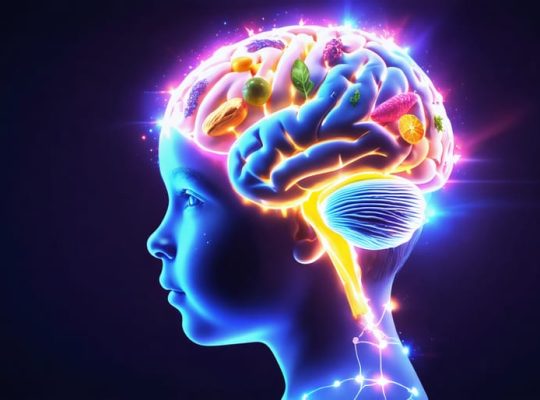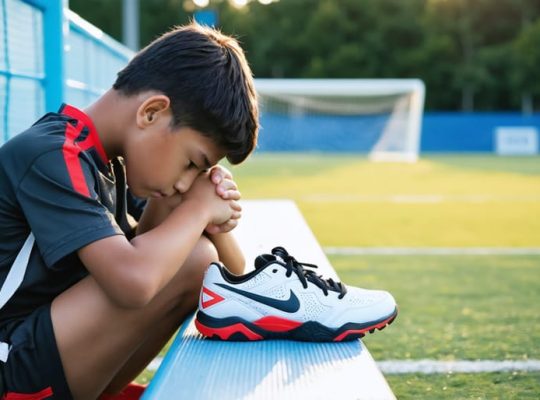Raising a glass of water might be one of the most powerful things you can do for your child’s mental well-being. Recent research reveals that even mild dehydration can trigger anxiety, irritability, and difficulty concentrating in children – symptoms that many parents mistakenly attribute to behavioral issues or learning difficulties. As our brains are 73% water, maintaining proper hydration isn’t just about physical health; it’s fundamental to emotional regulation, cognitive function, and overall mental wellness.
Think of your child’s brain as a complex garden that needs consistent watering to flourish. When hydration levels drop by just 1-2%, children can experience noticeable changes in mood, memory, and learning capacity. This connection between hydration and mental health is particularly crucial during school hours, where studies show that properly hydrated students perform up to 30% better on cognitive tests.
For parents and caregivers seeking to support their children’s mental health, understanding this vital connection opens the door to simple yet effective strategies that can make a significant difference in their child’s daily well-being.
The Science Behind Hydration and Brain Function
Water’s Role in Brain Development
Water plays a crucial role in your child’s brain development, starting from the earliest stages of life. Research has shown that proper hydration directly impacts mental sharpness in children, affecting everything from their ability to focus in class to their emotional regulation.
Think of your child’s brain as a complex network of pathways that need water to function smoothly. When well-hydrated, these pathways efficiently carry important messages throughout the brain, supporting learning, memory formation, and emotional processing. Dr. Sarah Martinez, a pediatric neurologist, explains: “Water helps transport nutrients to the brain and removes waste products, creating an optimal environment for brain cell development.”
During critical growth periods, maintaining proper hydration becomes even more important. Water helps form and maintain the protective coating around nerve fibers, supporting healthy brain development and function. It also helps regulate neurotransmitters – the brain’s chemical messengers that influence mood, attention, and behavior.
Simple actions like offering water throughout the day and making hydration fun can support your child’s cognitive development and emotional well-being.
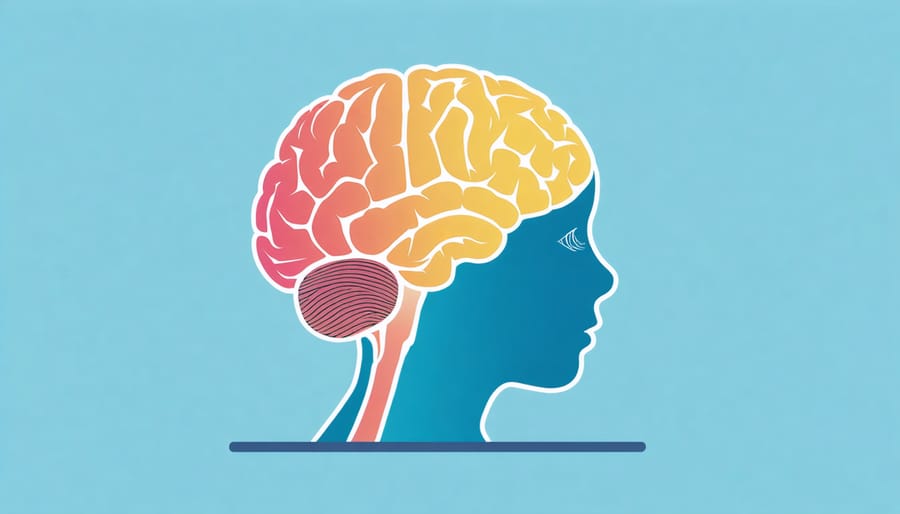
Dehydration’s Impact on Mood and Behavior
Even mild dehydration can have a significant impact on mental well-being, particularly in children who may not always recognize their thirst cues. Parents often notice their children becoming irritable, unfocused, or unusually emotional when they haven’t had enough water. These mood changes aren’t just coincidental – they’re directly linked to how dehydration affects brain function.
When children don’t drink enough water, they commonly experience:
– Increased anxiety and nervousness
– Difficulty concentrating in school
– Unexplained mood swings
– Decreased energy levels
– Greater sensitivity to stress
Dr. Sarah Martinez, a pediatric behavioral specialist, explains: “Children’s brains are particularly sensitive to hydration levels. Even a 1-2% drop in hydration can affect their ability to regulate emotions and behavior effectively.”
These changes can be especially challenging in school settings, where children need to maintain focus and emotional stability throughout the day. The good news is that these symptoms typically improve quickly once proper hydration is restored.
Warning Signs of Dehydration in Children
Physical Indicators
Recognizing dehydration early can help prevent its impact on mental well-being. Watch for dry, cool skin that lacks elasticity – when pinched, it may take longer to return to its normal position. Cracked lips, a dry or sticky mouth, and dark-colored urine are clear indicators that your child needs more fluids. Sunken eyes and decreased tear production can also signal dehydration.
Physical fatigue, headaches, and dizziness often accompany dehydration and can affect mood and behavior. Children might complain of muscle cramps or weakness, particularly during physical activities. In younger children, a dry diaper for extended periods or the absence of tears while crying are concerning signs.
Pay attention to these symptoms, especially during hot weather, illness, or increased physical activity. Remember that by the time these physical signs appear, your child may already be experiencing mild dehydration, so it’s essential to encourage regular fluid intake throughout the day.
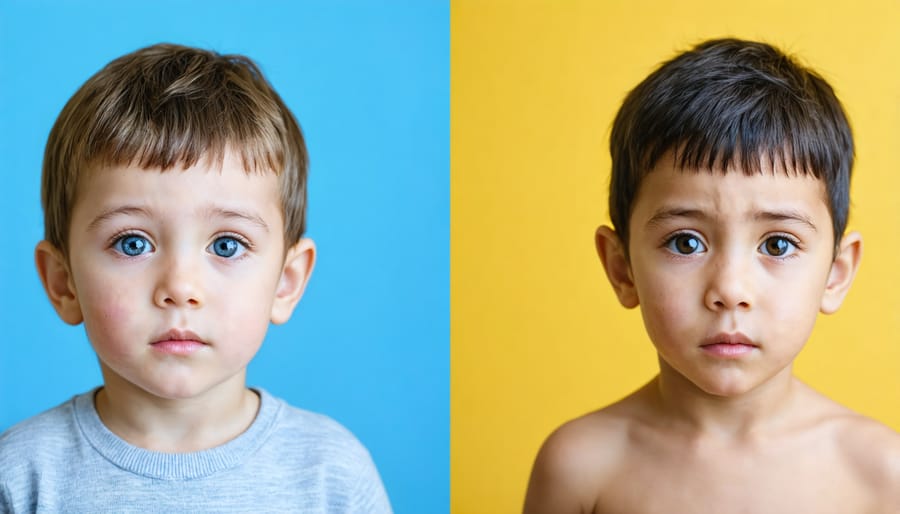
Behavioral and Emotional Changes
Dehydration can significantly impact a child’s mood and behavior, often in ways that might surprise many parents. Children may become irritable, anxious, or unusually quiet when they haven’t had enough water. Parents might notice their child showing signs of confusion, difficulty concentrating, or sudden mood swings.
Dr. Sarah Chen, a pediatric neurologist, explains: “When children are dehydrated, their brain cells can’t function optimally, leading to emotional regulation challenges. What might look like a behavioral issue could actually be their body signaling for water.”
Common behavioral changes include:
– Increased crying or emotional sensitivity
– Difficulty following instructions
– Reduced interest in play or activities
– Unusual fatigue or lethargy
– Heightened frustration or anger
– Problems with memory or learning
– Changes in sleep patterns
These changes often resolve quickly once proper hydration is restored. However, if these symptoms persist even with adequate fluid intake, it’s important to consult with your healthcare provider, as they might indicate other underlying issues.
Practical Strategies for Keeping Kids Hydrated
Making Water Fun and Accessible
Making water appealing to children doesn’t have to be a challenge. Just as we understand the importance of diet and mental health, we can transform hydration into an engaging daily activity. Try infusing water with colorful fruits like strawberries, oranges, or cucumber slices to create naturally flavored “spa water.” Children love choosing their own combinations and watching the colors blend.
Make drinking water interactive by using fun straws, special cups with beloved characters, or bottles marked with encouraging time-based goals. Some parents find success with apps that turn hydration into a game, where children care for virtual pets by tracking their water intake.
Create a hydration station at home or in the classroom with a dedicated area featuring a water dispenser, colorful cups, and fresh fruit for infusing. This makes water easily accessible and visually appealing. Consider freezing fruit pieces into ice cubes or making water-based popsicles for hot days.
Remember to celebrate hydration achievements with simple rewards like stickers or extra playtime. When children see drinking water as enjoyable rather than a chore, they’re more likely to maintain healthy hydration habits naturally. Share your own enthusiasm for drinking water – children often mirror adult behaviors, making you their best role model for healthy habits.
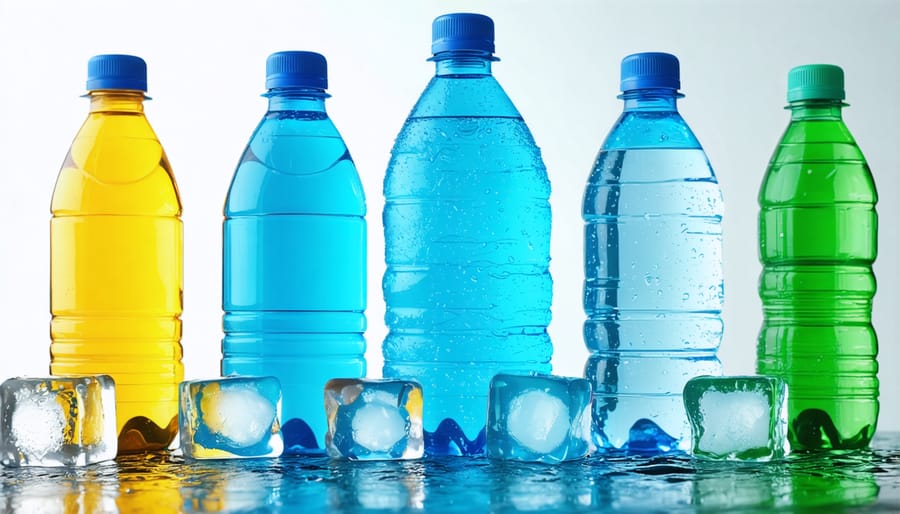
Creating Healthy Hydration Routines
Building healthy hydration habits doesn’t have to be complicated. Start by making water easily accessible – keep filled water bottles in visible locations at home, work, or school. For children, consider using fun, colorful bottles with measurement markers that make drinking water feel like a game.
Set regular “hydration checkpoints” throughout the day. These could be during meals, after physical activity, or at specific times like morning break and afternoon snack time. Parents can model good hydration habits by drinking water regularly themselves and making it a family activity.
Make water more appealing by adding natural flavors like fresh fruit slices, cucumber, or mint leaves. This can be especially helpful for children who find plain water boring. Create a reward system for meeting daily water intake goals, using sticker charts or digital tracking apps that make hydration fun and engaging.
Remember to adjust water intake based on factors like temperature, activity level, and individual needs. During hot weather or intense physical activity, increase water consumption accordingly. Keep in mind that thirst isn’t always the best indicator of hydration needs – by the time you feel thirsty, you might already be slightly dehydrated.
For parents and teachers, incorporate “water breaks” into daily routines, just like bathroom breaks or snack times. This structured approach helps establish lasting habits while making hydration a natural part of the day.
When to Seek Professional Help
While most cases of dehydration can be addressed at home, there are times when professional medical attention becomes necessary. As Dr. Sarah Chen, a pediatric specialist, notes, “Parents should trust their instincts when something doesn’t feel right about their child’s hydration status.”
Watch for severe symptoms such as extreme thirst, dry mouth and lips, decreased urination, or dark-colored urine. In children, be particularly alert if they become lethargic, irritable, or show sudden changes in behavior. Physical signs like sunken eyes, lack of tears when crying, or skin that doesn’t bounce back quickly when pinched (poor skin turgor) are red flags that require immediate attention.
Mental health symptoms that may indicate severe dehydration include:
– Confusion or disorientation
– Extreme mood swings
– Difficulty concentrating or focusing
– Unusual anxiety or panic
– Severe headaches
Seek emergency care if you notice:
– Rapid breathing or heart rate
– Fainting or severe dizziness
– Seizures
– High fever
– No urination for 8 hours or more
For individuals with existing mental health conditions, dehydration can exacerbate symptoms significantly. If you notice a sudden worsening of anxiety, depression, or other mental health issues alongside signs of dehydration, contact your healthcare provider immediately.
Remember that certain medications, especially those prescribed for mental health conditions, can affect hydration levels. Always consult with your healthcare provider if you’re concerned about medication interactions or if chronic dehydration becomes an issue despite adequate fluid intake.
Maintaining proper hydration is a crucial yet often overlooked aspect of supporting our children’s mental well-being. As we’ve explored throughout this article, the connection between hydration and mental health is significant and impacts everything from mood and concentration to anxiety levels and cognitive performance.
Remember that every child is unique, and their hydration needs may vary based on factors like age, activity level, and climate. By staying attentive to the warning signs of dehydration and implementing creative strategies to make water consumption fun and routine, we can help our children develop healthy hydration habits that will benefit their mental health throughout their lives.
Start small by introducing one new hydration habit at a time, whether it’s setting regular water breaks during homework sessions or making fun fruit-infused water together. Celebrate progress and remain patient as these habits develop. If you notice persistent concerns about your child’s hydration or mental health, don’t hesitate to consult with healthcare providers who can offer personalized guidance and support.
Together, we can help our children thrive by ensuring they stay properly hydrated, setting them up for better mental health and academic success.

